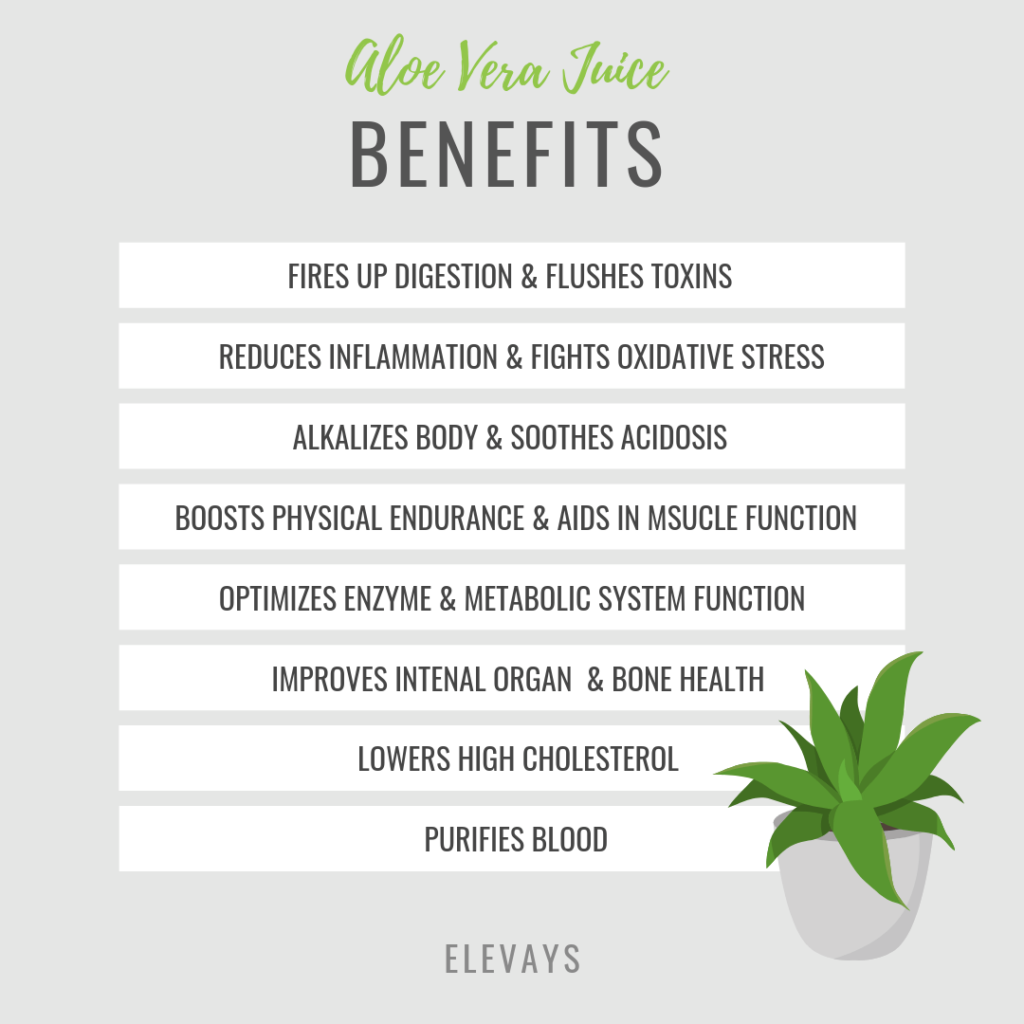The benefits of aloe vera have been praised for centuries: Chinese medicine uses it to treat fungal diseases, Indian medicine uses it for constipation, and nowadays, we use it for ultimate soothing after a long day at the beach.
But the power of aloe vera goes far beyond its topical use– and social media is starting to catch on. You may have started to see your favorite Instagram health influencers taking morning shots of aloe vera or adding the desert plant to their breakfast smoothie. And you probably find yourself here now because you dove down the rabbit hole to learn why you should be drinking it, too.
Consumption of aloe vera drink or beverage can help with digestion, aging, and organ health. But there is much more than that! Read on to discover the wonderful benefits of aloe vera juice and how to make sure your getting the best kind.
How Much Aloe Vera Juice to Drink Daily
If you choose to drink an aloe vera juice daily, keep your intake at safe doses. That just means- don’t go overboard! Aloe vera juice acts as a laxative for many but long term use for laxative effects can actually lead to constipation. Research has shown that aloe vera is beneficial for people with gastrointestinal problems and found that consuming 100 ml of aloe vera juice has no negative side effects (1).
To reap all the benefits without going overboard, drink no more than 2 to 3.5 fl oz (50-100 ml) daily. That’s about the size of a shot glass, so if you can deal with the slightly unpleasant taste try throwing back a shot or if you want to enjoy a refreshing drink, combine with water and honey or coconut water.
Benefits of Drinking Aloe Vera Juice First Thing in the Morning
Drinking aloe vera juice first thing in the morning on an empty stomach can help fire up digestion, boost immunity, and hydrate you. We know how important it is to stay hydrated, but sometimes water seems too boring and we need to spice it up. This is where your aloe juice will come in.
You can give your body some serious love in the morning by making sure you’re hydrated, healthy, and regular. What better way to offer some ease to your digestive tract than by flushing out all of the toxins AND replenishing your body with ultra hydration and awesome nutrients?
Benefits of Aloe Vera Juice

Before reading this, you may have thought that aloe vera was only used topically to treat burns, wounds, infections and other skin issues. We know now that internal use of aloe vera can treat a wide range of problems all the way from a toxic liver to early wrinkles. Think assimilation, circulation, and elimination: that’s what aloe vera does best internally.
Internal use of aloe vera juice can reduce inflammation, lower high cholesterol, purify blood, prevent candida, soothe arthritis pain, improve cardiovascular health, fight oxidative stress, aid in muscle function, and boost physical endurance (3).
Here’s all the reasons why aloe vera is so great at being so great:
- Antioxidant Vitamins to help neutralize free radicals: vitamins A, C, E, B12, choline, folic acid
- Alkaline nature helps alkalize the whole body and soothe acidosis
- Enzymes to break down fats and sugars and tamp down inflammation: aliase, amylase, alkaline phosphatase, bradykinase, carboxypeptidase, cellulase, catalase, lipase, peroxidase
- Essential minerals for internal organ and bone health & optimal enzyme and metabolic system function: calcium, copper, selenium, chromium, manganese, magnesium, potassium, sodium, zinc
- Anthraquinones help flush out toxins and act as analgesics, antivirals, and antibacterials
- Fatty Acids with analgesic, antiseptic, and anti-inflammatory benefits: cholesterol, campesterol, beta-sisosterol, lupeol
- Sugars for their anti-allergic and anti-inflammatory properties: monosaccharides and polysaccharides
(1,2,3)
Aloe Vera Juice for Digestion
The use of aloe vera to treat constipation has heap-loads of supporting research.
The anthraquinones found in the latex (the part obtained from the cells just beneath the leaf skin) make aloe a powerful laxative that triggers mucus secretion and increases intestinal water content (2).
Besides the plants laxative components, aloe vera is also anti-inflammatory, increasing its ability to aid in digestion. Since aloe vera normalizes the body’s pH balances by increasing alkalinity, consuming aloe juice will promote bowel regularity while also decreasing yeast formation (2). Aloe juice also acts as a prebiotic by encouraging healthy gut bacteria growth (1).
A study from the Journal of research in Medicinal Sciences found that drinking aloe vera juice can help relieve symptoms of Irritable Bowel Syndrome (IBS). The study discovered that drinking 30 ml of aloe vera daily relieved abdominal discomfort and excess gas in IBS patients (1). Stool consistency, frequency and urgency stayed the same. Research also found that consuming aloe has an antibacterial effect on the gut helping destroy strains of E. coli and Streptococcus bacterial infections (4).
Aloe Vera as an Immune System Booster
Because aloe vera has antiseptic, anti-inflammatory, antiviral, and antifungal properties it is a superhero when it comes to fighting infection and creating a safe home inside your body. Aloe vera contains various components that boost cell energy allowing them to function properly. Enzymes found in aloe break down proteins from food into amino acids and turn them into cell fuel. For example, bradykinase kills infections and stimulates the immune system while zinc helps fight off disease, destroy bad bacteria, and maintain immune function (2).
Aloe Vera Juice Weight Loss
Many people are quick to jump on the aloe vera beverage bandwagon because they heard it can help them lose weight. The reason why this assumption is a little off is due to its laxative effect. Because you may experience an extreme flush of toxins, that is not necessarily fat melting off your body. But don’t get too upset because supplementing with aloe vera juice while abiding by a healthy, whole foods diet can help improve your metabolism. The vitamins, minerals, and amino acids found in aloe can give your metabolic system the extra love it needs to function at its optimal state (1).
Aloe Vera Juice for Liver Health
Because of its high levels of antioxidants, aloe vera juice can be your liver’s best friend. A medical study done on rats undergoing radiation therapy found that consuming aloe vera juice helped protect the liver and kidneys (5).
Another study found that consuming aloe beverage can help prevent alcohol-induced liver damage (6).
Aloe Vera for Inflammation
This is where you may get excited. Inflammation wreaks havoc on our bodies causing free radical damage and oxidative stress–which all lead to aging! Vitamins and antioxidants (A, C, E) help maintain healthy vision, reduce free radical damage and slow down the aging of cells. If you are looking for healthy skin, good eyesight, and optimal neurological function, aloe vera juice is a great source of all the key players that help reduce inflammation in the body (2).
Aloe Vera Juice Side Effects
Do not consume aloe vera in high doses over a long period of time because it may lead to stomach pain, cramps, diarrhea, constipation, kidney problems, low potassium, muscle weakness, and blood in the urine. If you stick to the daily dose recommendations above, you should be in the clear (1,2).
Consult with your health care provider before consuming aloe vera juice if you have kidney problems, diabetes (studies suggest it may lower blood sugar), intestinal conditions such as Crohn’s disease and ulcerative colitis (2,3).
Buying Aloe Vera
Today, commercial methods used to extract aloe vera usually result in a product with little to no active ingredients. The International Aloe Science Council began a certification program that approves the quality and quantity of aloe vera in commercial products. To find the best aloe, make sure to look for this certification on the label.
If you want to have an aloe plant at home, make sure to keep it by a window with tons of sunshine. You can even place it outdoors in the summertime and water 2-3 times a month and once a month during the winter months.
Aloe Vera Juice Recipe
Making your own aloe vera juice at home is not only the best way to get the freshest aloe vera beverage but also arguably the healthiest way. When you make your aloe vera beverage at home, you know what you’re consuming is free of additives. Many aloe vera drinks on the market are stuffed with junk to make them taste good and last long– and if we want the good stuff those are exactly the aloe drinks we want to avoid. Try this easy recipe at home for the freshest and most beneficial aloe vera juice.
Instructions:
- Cut a few leaves, wash and pat dry
- Slice and discard the edges of the aloe vera leaves
- Cut the rind from the front and back of the leaves and dispose (option to use a peeler)
- Throw out the yellow-green gel found just under the rind so that you only have the clear gel left
- Store clear gel in glass jar in refrigerator
- When you are ready to drink, take 2 tablespoons of the gel, place in blender and add 1 cup of water (option to add raw organic honey), coconut water, or smoothie and blend until smooth
Morning Aloe Vera Juice Drink
Flush toxins and fire up digestion with this recipe
Ingredients:
- Aloe vera
- 1 lemon
- 2 slices of fresh ginger
- 2 teaspoons of raw organic honey (optional)
Instructions:
- Follow the instructions above to retrieve your aloe then combine with ingredients listed above
- Blend until smooth, and enjoy!
Sources:
- “Everyone Is Suddenly Drinking Aloe Vera Juice – Here’s Why.” Healthy and Natural World, 24 Feb. 2019, www.healthyandnaturalworld.com/drinking-aloe-vera-juice-benefits/.
- Ruggeri, Christine. “Aloe Vera Benefits for Skin, Constipation & Immune System.” Dr. Axe, 2 Aug. 2018, draxe.com/aloe-vera-benefits/.
- medicalmedium.com, Medical Medium at. “Aloe Vera.” Medical Medium, www.medicalmedium.com/blog/aloe-vera.
- https://www.ncbi.nlm.nih.gov/pmc/articles/PMC4557234/
- https://www.ncbi.nlm.nih.gov/pubmed/14703976
- https://www.ncbi.nlm.nih.gov/pubmed/22308658









Thank you For sharing Such an Amazing article about benefits of Aloe-vera , I found here which i was looking for many days . Really Thankful to you
You’re welcome! Glad it was helpful for you!
you explore this topic in a very effective way I want to appreciate your work, thank you for sharing such useful information!!
You’re welcome, I’m glad it was helpful for you!